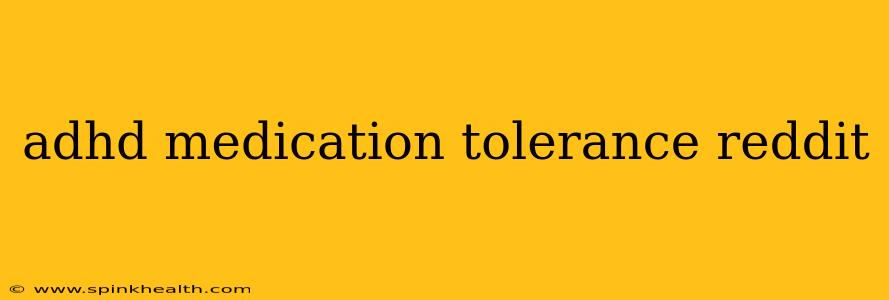The bustling digital world of Reddit, a vast tapestry woven with threads of shared experiences and expert opinions, often serves as a sounding board for those navigating the complexities of ADHD. One frequently discussed topic is medication tolerance – that gradual diminishing of a medication's effectiveness over time. This isn't just a Reddit concern; it's a real phenomenon impacting many individuals with ADHD. Let's explore this issue, delving into common experiences, expert advice, and potential solutions based on the wealth of information available online and in the medical community.
What is ADHD Medication Tolerance, and How Does it Feel?
Imagine your trusty ADHD medication, once a vibrant sunrise chasing away the fog of inattention, slowly fading into a pale dawn. That's the essence of medication tolerance. The initial benefits—improved focus, reduced impulsivity, better organization—begin to wane. Reddit users often describe it as feeling like the medication is "wearing off" sooner, requiring higher doses to achieve the same effects, or simply experiencing a less pronounced improvement in symptoms. Some describe a return of core symptoms, impacting daily life and function. The feeling is different for each person, but a common thread is the frustration of losing the initial therapeutic benefits.
How Common is ADHD Medication Tolerance?
The prevalence of medication tolerance in ADHD treatment is a significant concern. While precise figures vary depending on the specific medication and individual factors, it's a relatively common occurrence. The exact percentage is difficult to pinpoint definitively, but many studies indicate a sizeable portion of individuals with ADHD experience a decline in medication effectiveness over time. Reddit discussions reveal a widespread awareness of this issue, underscoring its real-world impact. This isn't necessarily a sign of treatment failure, but rather a typical challenge in managing a chronic condition.
What Causes Tolerance to ADHD Medications?
Several factors can contribute to tolerance to ADHD medications. One leading theory involves changes in the brain's neurotransmitter systems. As the medication continues to work, the brain may adapt, requiring more of the medication to achieve the same effect. Genetic predispositions, lifestyle factors (such as diet, sleep, and stress levels), and co-occurring conditions can also play a role. The exact mechanisms are still being studied, but it's likely a complex interplay of biological and environmental influences.
Can You Develop a Tolerance to ADHD Medication? And if so, what should I do?
Yes, you can indeed develop a tolerance to ADHD medication. This doesn't mean the medication is no longer working, but that its effectiveness has decreased. If you suspect you've developed a tolerance, it's crucial to consult your doctor immediately. They will be able to assess your situation, possibly adjusting your dosage, or exploring alternative treatment options. Self-treating can be dangerous and ineffective. It's vital to have open communication with your healthcare provider about any changes in symptom management.
What are the different types of ADHD medication, and do they all have the same tolerance issues?
Different types of ADHD medication have varying mechanisms of action and potential for tolerance development. Stimulants, like methylphenidate (Ritalin) and amphetamine (Adderall), are more likely to produce tolerance than non-stimulant medications like atomoxetine (Strattera). However, even with non-stimulants, some degree of adaptation can occur. Your healthcare provider can discuss the pros and cons of different medication options and explain how tolerance may manifest differently for each.
Is there a way to prevent or delay tolerance to ADHD medication?
While you cannot completely prevent tolerance, certain strategies may help delay its onset or lessen its severity. Maintaining a healthy lifestyle is critical: prioritize regular sleep, a balanced diet, consistent exercise, and stress management techniques. Open communication with your doctor is paramount, allowing for proactive adjustments to your treatment plan before tolerance becomes a significant issue. Regular monitoring of your medication’s effectiveness can signal the need for change.
What are the alternative treatment options if medication tolerance becomes a problem?
If tolerance significantly impacts your treatment, your doctor may explore several alternatives. This could involve adjusting the medication dosage, switching to a different medication, or adding other therapies, such as behavioral therapy or coaching, to your treatment plan. A holistic approach that incorporates lifestyle changes and therapeutic interventions alongside medication adjustment often yields the best results.
This exploration of ADHD medication tolerance on Reddit reflects a common experience within the ADHD community. Remember, open dialogue with your healthcare professional is essential for managing this aspect of your treatment effectively and safely. Never adjust your medication dosage without consulting your doctor. Your health and well-being are paramount.

